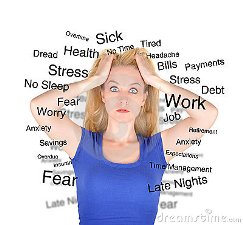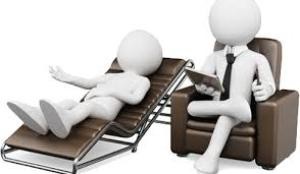 Stress, anxiety and tension may be the commonest of the psychiatric disorders, but they do not attract as much attention because they are less dramatic in nature. Stress can date back to the cave man, who must have been faced with the ‘fight or flight’ experiences in daily life. Situations like facing a ferocious animal have taken a different shape now. More important and even worse, is the chronic shape of stress and anxiety that has taken the place of physical danger. The urge for financial security, power, status, disruption in family life, lack of sleep, lack of time for relaxation and vacation, is playing havoc with our lives.
Stress, anxiety and tension may be the commonest of the psychiatric disorders, but they do not attract as much attention because they are less dramatic in nature. Stress can date back to the cave man, who must have been faced with the ‘fight or flight’ experiences in daily life. Situations like facing a ferocious animal have taken a different shape now. More important and even worse, is the chronic shape of stress and anxiety that has taken the place of physical danger. The urge for financial security, power, status, disruption in family life, lack of sleep, lack of time for relaxation and vacation, is playing havoc with our lives.
Contemporary stress tends to be more pervasive, persistent and insidious because it stems primarily from psychological than physical threats. It is associated with ingrained and immediate reactions over which we have no control that were originally designed to be beneficial.
Stress manifests with both physical and psychological symptoms. Our fight-or-flight response is our body’s sympathetic nervous system reacting to a stressful event. Our body produces larger quantities of the chemicals cortisol, adrenaline and noradrenalin, which trigger a faster heart rate, heightened muscle preparedness, sweating, and alertness – all these factors help us protect ourselves in a dangerous or challenging situation.
Non-essential body functions slow down, such as our digestive and immune systems when we are in fight-or flight response mode. All resources can then be concentrated on rapid breathing, blood flow, alertness and muscle use.
Stress activates certain parts of the nervous system called limbic system which is connected with many body organs through a wide network of autonomic nerves. It creates a hormonal storm in the body, with the pounding of heart, rising blood pressure and tension of muscles. An excessive activation of autonomic nervous system can produce symptoms in the chest, heart, abdomen, eyes, mouth, face or limbs and many other parts of the body. One can experience pain, discomfort, weakness, etc. One can feel the beat of the heart or even experience a missing heart beat. In some cases even the breathing rate may increase.
If you were to ask a dozen people to define stress, or explain what causes stress for them, or how stress affects them, you are likely get 12 different answers to each of these questions. The reason for this is that there is no definition of stress that everyone agrees upon; what is stressful for one person may be exciting for another, and might have little effect on others. We all react to stress differently.
It is important to learn that what matters more than the event itself is usually our thoughts about the event when we are trying to manage stress. How you see that stressful event will be the largest single factor that impacts your physical and mental health. Your interpretation of events and challenges in life may decide whether they are invigorating or harmful for you.
Conflicting with popular belief, stressors are not the cause of health issues; rather, it is people’s reactions to these stressors that determine whether in future these will have negative health consequences.
A persistently negative response to challenges will eventually have a negative effect on your health and happiness. Experts say people who tend to perceive things negatively need to understand themselves and their reactions to stress-provoking situations better. Then they can learn to manage stress more successfully.
Research shows that the reaction to a stressful situation now, can predict your health problems for 10 years down the road, regardless of your present health and stressors.
David Almeida, professor of human development and family studies at Penn State says, “For example, if you have a lot of work to do today and you are really grumpy because of it, then you are more likely to suffer negative health consequences 10 years from now than someone who also has a lot of work to do today, but doesn’t let it bother her.” Researchers at the University of Western Ontario found people who believe stress is affecting their health in a big way are twice as likely to have heart problem ten years later.
are more likely to suffer negative health consequences 10 years from now than someone who also has a lot of work to do today, but doesn’t let it bother her.” Researchers at the University of Western Ontario found people who believe stress is affecting their health in a big way are twice as likely to have heart problem ten years later.
On the other hand there are also many people who are unable to analyze their psychological melodies and attribute these symptoms to a known physical disease. Some patients are so strongly convinced that they suffer from a physical disease; they do not want to entertain the idea that their own emotions are responsible for their physical symptoms. A few of them also undergo surgeries like appendicectomy,choleccystectomy or hysterectomy without any improvement. Studies have shown that about 40 percent of patients attending various health centres do not have any specific physical disease. They only have physical symptoms.
COPING WITH STRESS
The key to reducing stress is to prevent it.
When doctors fail to make an adequate diagnosis, you must know that your illness is functional, that means more than physical you have a psychological problem. Just as stress is different for each of us, there is no stress reduction strategy that is a panacea. The key to reducing stress is to prevent it. Getting enough sleep, a proper diet, avoiding excess caffeine and other stimulants and taking time out to relax may be helpful in this regard. Get proper health care for existing or new health problems. Many stress relievers work because of the power of the placebo effect that comes from having faith in the procedure or the therapist.
Some people have inhibitions of visiting a psychiatrist or a therapist. Any time one hears someone say their friend or loved one “should” go for therapy it sounds like a condemnation, and that’s contributing to the stigma surrounding psychotherapy. Too many contentious arguments end with the shaming comment “You should go to therapy!” which is shorthand for “I think you’re crazy, go pay someone to fix you.” That’s so unfair…. therapy is effective for helping painful experiences become tolerable. It’s a proven method for changing harmful thinking, relational, and behavioral patterns, not only that it’s also used to make good lives great. Seek help from a qualified mental health care provider if you are overwhelmed, feel you cannot cope, have suicidal thoughts, or are using drugs or alcohol to cope.
Strong emotional support from group therapy, family or friends is a powerful stress buster. Stay in touch with people who can provide emotional and other support. Ask for help from friends, family, and community or religious organizations to reduce stress due to work burdens or family issues, such as caring for a loved one. Strong emotional support from group therapy, family or friends is a powerful stress buster. Ask for help from friends, family, and community or religious organizations to reduce stress due to work burdens or family issues.
Explore stress coping programs
Other very different approaches like acupuncture, acupressure, biofeedback, Alexander, Reiki, and other bodywork and postural techniques can achieve the same results because they reduce feelings of helplessness and provide a sense of control over the problem. Explore stress coping programs, which may incorporate meditation, yoga,  tai chi, or other gentle exercises. Some people find that listening to music, hobbies, volunteer work, keeping a daily journal of events and how they feel, laughter, playing with pets, taking short breaks or shopping, help them relax. Others find relief for their stress related symptoms from aromatherapy, nutritional supplements like chamomile, spearmint, etc.
tai chi, or other gentle exercises. Some people find that listening to music, hobbies, volunteer work, keeping a daily journal of events and how they feel, laughter, playing with pets, taking short breaks or shopping, help them relax. Others find relief for their stress related symptoms from aromatherapy, nutritional supplements like chamomile, spearmint, etc.
There are also prescription tranquilizers, sedatives, hypnotics, anti-depressants and beta-blockers for specific complaints. In addition, a variety of cranio-electromagnetic stimulation devices have been found to be effective and safe for anxiety, insomnia and drug resistant stress. These must however be consumed only under prescription of a medical practitioner/ psychiatrist, and strictly as per advise.





